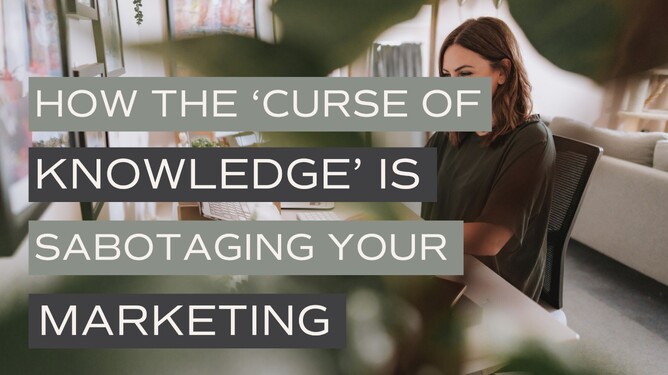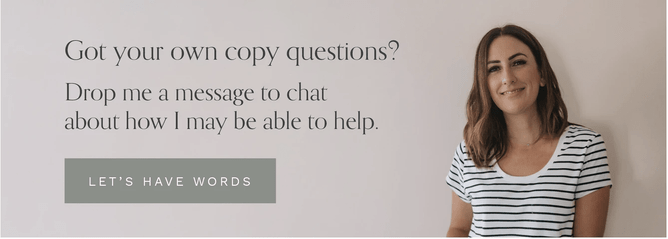You’re an expert. You know your industry inside and out, and you’re used to navigating complex details every day. But here’s a common trap many experts fall into: the curse of knowledge – a cognitive bias that could be holding you back from sharing valuable ideas because they feel too basic, obvious, or unoriginal.
When I chat to business owners and solopreneurs about their challenges when it comes to creating content for their brand, a very common response is that they don’t know what to share. And yet, they have plenty to share, they just don’t realise it’s valuable.
When you assume that others already know what you know, you may end up dismissing topics that could actually make a big impact. You might think, “Everyone already knows this,” or “That’s too basic to share.” But often, these “obvious” ideas can be incredibly valuable, and breaking free from the knowledge bias mindset can actually improve your marketing.
What is the Curse of Knowledge?
The curse of knowledge or ‘knowledge bias’ is a psychological bias where someone with extensive knowledge on a subject assumes others have a similar understanding. Often it becomes apparent through the use of jargon or industry-specific language, or glossing over details or basics.
But for business owners, it can also mean you take for granted what your customers don’t know. You might avoid sharing simple ideas, tips, and information that you assume everyone already understands. This bias can lead you to undervalue your content, or not share ideas at all.
Are you actually just confusing people?
I admit that I’ve often felt frustrated with social media. I’ve written what I think are really helpful, insightful posts and…crickets. Why are people not appreciating this deep, brainy thinking of mine? I’ve made assumptions of what they already know, and I’ve gone too high-level and lost them. They want simple, actionable stuff that makes sense for where they are at.
How the Curse of Knowledge limits your marketing
When you believe that certain information is “too basic,” you risk not only limiting your content but also miss connecting with an audience who may find that information valuable. Here’s what I see happening:
You’re holding back on valuable content: You might have countless insights that could resonate with your audience – but you’re not sharing them because they feel too rudimentary. This could include simple explanations, how-to guides, or foundational knowledge about your industry. While these ideas may seem obvious to you, they can be incredibly insightful for your audience.
You’re assuming everyone already knows: When you skip over what feels like “common knowledge,” you could miss out on educating and attracting new customers who are still learning. What may seem second nature to you is often new and helpful to others, especially those unfamiliar with your industry.
You’re undervaluing your own expertise: By assuming your ideas are too basic, you’re undervaluing the very expertise that sets you apart. This can create a cycle of self-doubt, where you start to believe you don’t have anything valuable to share. But sharing even the most elementary concepts can demonstrate your understanding (and your ability to communicate ideas well) and build trust with your audience.
You're not monetising your knowledge: You're sharing knowledge and insight for free that could easily be packaged up and offered as consulting or as an educational programme. You think no one would pay for learning or understanding these basics, when you could actually be capitalising on your experience by charging others to access it.
How to banish the Curse of Knowledge
If you’re guilty of holding back and feeling like you ‘don’t have anything valuable to share’, here are some strategies to help you break free from knowledge bias:
Recognise the value of your “basic” ideas
Your expertise is what sets you apart. Not just what you know, but how you work. Just because something feels simple or obvious to you doesn’t mean it’s common knowledge for others - and articulating your way of doing things will be the differentiator. Embrace the value of your ideas, no matter how simple they may seem to you, and remember that your audience may be looking for exactly this kind of insight. The difference is in your delivery. The way you share an idea could be the time it finally makes sense to someone!Start small and build confidence
Begin by sharing small, foundational tips and watch how your audience responds. You might be surprised by how much engagement you receive. Even a basic blog post, tutorial, or social media post can attract attention, educate your audience, and establish your authority.Test your assumptions
Ask friends, family, or new clients for feedback on your content. You might discover that they find certain topics less familiar than you’d assumed. By testing your assumptions, you can gain insight into what your audience actually knows and what they need to learn.Focus on teaching, not selling
When you approach your content as an opportunity to teach rather than to sell, you can connect with your audience on a more personal level. Instead of worrying about whether your ideas are too simple, focus on helping your readers learn something new.
Not everyone is looking for ‘how to’ content and not everyone is going to follow it; the point is that they’ll recognise you’re willing to share your approach, help and educate; you’re not gate-keeping ideas, and they’ll get a feel for how you think and work. This builds trust with your audience, making them more likely to return to you as a reliable source when it's time to spend their money.
And when you consistently share valuable information, you reinforce your expertise and authority in your field. This will encourage more word-of-mouth referrals and a stronger reputation that leads to opportunities like workshops, speaking panels and podcasts! #thoughtleadership baybee.
Remember, even 'basic' knowledge can be a powerful tool; there is always someone hearing it for the first time – so don’t be afraid to share it!


